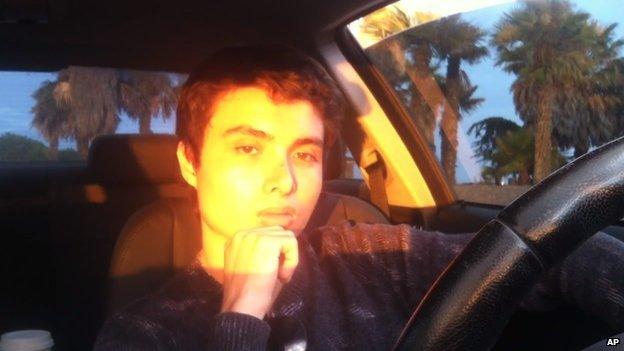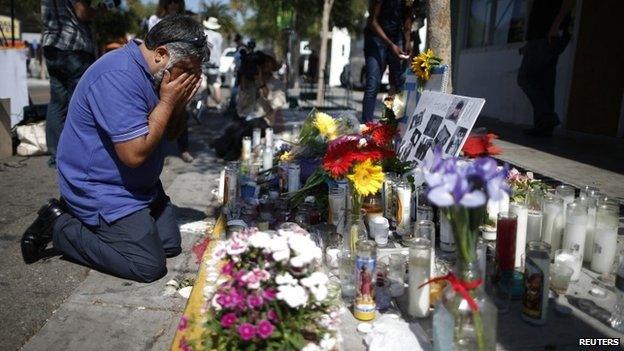How I tried to help Elliot Rodger
- Published

When a student, Elliot Rodger, went on a rampage in California in May, killing six people, one man began wondering if he could have prevented it. Hollywood screenwriter Dale Launer knew Rodger and had tried to help solve his problems with women.
On the night before the killings, at 21:18, Elliot sent me and 22 other people an email containing his so-called manifesto.
I read the first 10 pages. It contained many of the complaints that Elliot had mentioned before about women and society but this was more focused and filled with anger.
I was concerned for him - it was written in a way that made me think it could be a suicide note. I did think then, maybe he was becoming unhinged.
The next morning I woke up and checked my email - a friend had sent me a message saying I knew the Isla Vista shooter.
I hoped he hadn't killed anybody, but of course he had. I felt absolute horror and shock.
I've never considered myself responsible but you can't help feeling guilty. Could I have done something to stop it even though there was no way to know what was about to happen?
The Elliot portrayed in the manifesto and in the video he made was not the Elliot that I remember.
The person in that video was cocky, arrogant and hateful - the Elliot I knew was a very meek, timid and awkward kid.
I first met him when he was aged eight or nine and I could see then that there was something wrong with him.
I'm not a psychologist, but looking back now he strikes me as someone who was broken from the moment of conception.
It appeared to me that he had an overwhelming lack of confidence but not in a particularly endearing way. Sad, but not endearing.
You were hoping that inside there was a normal kid wanting to come out - that he would overcome his shyness and bloom in some way. What became evident, only after reading the manifesto and watching that video, was that what he was actually hiding was this horribly twisted little monster.
In the past, at times, he showed some bitterness and even some veiled anger but that anger wasn't remotely acted out in any way.
He never raised his voice - he didn't even seem capable of raising his voice. He didn't slam doors or pound his fist. I couldn't imagine him making a fist.
In retrospect, you can point out a few clues, a few cracks to the malevolence percolating underneath but they were overshadowed by someone who seemed incapable of any kind of action.
He did not simmer or seethe. The boldness he showed in that video wasn't something I ever saw before.
We met a few times and emailed a lot. He seemed convinced that women hated him but he could never tell me why.
It seemed like he would perceive cruelness or hatefulness when in fact, I suspected, he was just being ignored.
I remember giving him an assignment once so he could try to establish some kind of dynamic with a woman.
I told him, "When you see a woman next time you're on campus and you like her hair or sunglasses, just pay her a compliment."
I told him, "It's a freebie, something in passing, you're not trying to make conversation. Keep walking, don't make any long eye contact, just give the free compliment." The idea being you might make a friend if you make someone feel good.
I said to Elliot, "In the next few weeks - if you see them they'll likely give you a smile - and you can smile back and eventually turn this into chit-chat."
I got in touch with him a few weeks later and asked if he did it. He said "no". And when asked why not, he said "Why do I have to compliment them? Why don't they compliment me?"
At that stage, I realised he was very troubled.


How Dale Launer knew Elliot Rodger
Dale Launer has written films including Dirty Rotten Scoundrels, My Cousin Vinny and Blind Date
He met Elliot's father, Peter Rodger, a commercial photographer and director, about 15 years ago
Last year, Peter told Dale that his son was frustrated because he lacked experience with women
Dale was developing a TV programme with a 20-year-old man as one of the characters and thought it would be mutually beneficial to help Elliot with some advice - Peter agreed
Elliot mentioned his conversations with Dale in the manifesto he sent the night before the killings

In one of the last emails I sent to him, I became quite frustrated.
I pointed out that he had the choice to change his circumstances, and if he didn't make the effort then he had to take some of the blame. He insisted that, "I have to blame someone for my troubles, and I don't blame myself."
People did try to help him, he was getting support, but he was such a sad little character - whenever you saw him he was always unhappy.
I recall a mutual friend saying to me once, "I've never seen Elliot smile."
One time there was a gathering at his parents' place and Elliot was his usual uncomfortable self.
I asked Peter if Elliot was ticklish. Peter said he was, so I encouraged a couple of women to tickle him and you know, that was the only time I saw Elliot express any kind of joy. It seemed that, at least for those moments, he was a normal kid.

The college town of Isla Vista was in mourning after the attacks
Some people think the manifesto he wrote was a fairly accurate assessment of his life when in fact it was very skewed.
He portrayed his stepmother as some kind of cruel, horrible character out of a fairy tale but she is a lovely, kind, decent woman.
His brother and sister are normal, vibrant, charming children but, from reading his manifesto, that's something he seemed to resent.
For his family, every day is now a bad day and they are trying their best to cope with it.
It's such a difficult thing to have this kid that you loved his whole life and then he does this horrible thing that just makes you so angry. Trying to reconcile those two feelings is a very hard thing to do.
When people like Elliot can go into a store and buy a gun that makes America less safe. I'm not anti-gun, I own guns myself but this is ridiculous. People like this should not be able to own guns.
I hope things will change and we can find some way of ensuring that dangerous people can't access guns. But it's difficult because not until the very end did Elliot ever show his violent nature.
You see people on TV every day whose anger is clearly out of control - he wasn't like that.
Perhaps, looking back, there were glimpses of callousness that might have been a clue but mostly he was a very controlled, passive and retiring person.
Since May, I've been asking myself what was wrong with Elliot - what made him do this? This is something I've been thinking about a lot.
I remember my parents had a dog that gave birth to five puppies and four were just lovely, normal, happy, little puppies.
Then there was a fifth puppy, called Pipper - he was smaller than the rest, sometimes he would tremble, he was never any fun, wouldn't play with the other puppies and would always seem afraid.
I don't know what it is that made Pipper like that but whatever it is, that would describe Elliot.
Dale Launer spoke to World Update on the BBC World Service
Subscribe to the BBC News Magazine's email newsletter to get articles sent to your inbox.